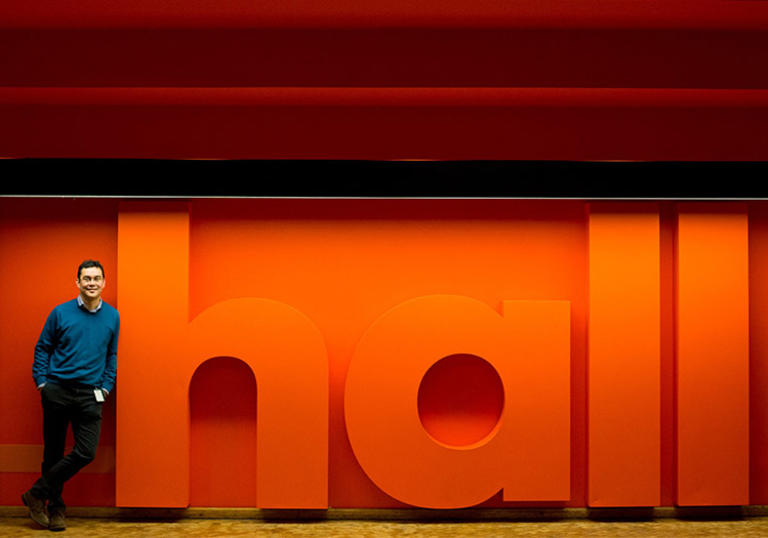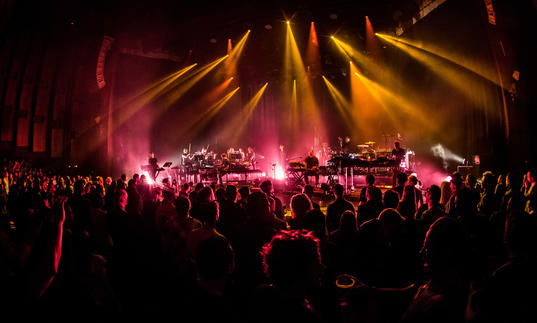Having read Music at Oxford University, had spells at Askonas Holt Ltd, the European Union Youth Orchestra and the Melbourne Symphony Orchestra, Huw Humphreys made the move from Australia back to the UK to join us as our Head of Music in September 2014.
We caught up with Huw to learn more about being a Barbican ‘newcomer’, the challenges and excitements about his job and some of his favourite Barbican discoveries so far…
How long have you been working at the Barbican?
Although I’ve been associated with artists and orchestras visiting the Barbican for the last twenty years, I’ve only been a member of staff for a mere three months. I feel a fraud for answering these questions so early in my tenure!
Talk us through your average working day.
As I tend to do the school run in the morning, I am normally one of the earlier arrivals in the Music Office and I really value the quiet before the storm to get my head around my schedule and to have a think about what I want to achieve that day. Then there are the inevitable meetings – both internal and external – and, being new, a lot of these are meet and greets. I try to keep meetings within the department as short and focussed as possible as I think you achieve more this way than with a sprawling agenda. I try to pop backstage at least once a day on performance days, both to greet visiting artists and to check-in with the stage and technical teams. My most productive time in terms of answering e-mails and other correspondence is after 6pm when the office is a little quieter and I really value this time before evening concerts begin at 7:30pm. Balancing concert attendance and family life is a balancing act, especially as concerts can lead to post-concert dinners and very late nights. The alarm goes off at 6:20am whatever time I’ve gone to bed…
What is the best part of your job?
Although it might seem a clichéd answer, the best part of my job is the people I get to work with. I do feel both blessed and inspired by working with such a committed Music team, right across the board from stage and technical to production, programming and planning. No one ever seems to simply ‘do their job’; going above and beyond the call of duty seems to be routine.
What is the most challenging part of your job?
The breadth of responsibility in the role of Head of Music is certainly one of the most challenging aspects of the position. My days are spent evaluating conflicting demands on the Barbican Hall’s diary and conflicting demands on the department budget. People management is obviously a significant part of the position as well as ensuring that the various strategic relations that the Barbican holds are in good health; tending to these relationships – both internal and external – takes up substantial time. And, of course, no one relishes saying “no” to colleagues who are deeply committed to fantastic projects and concerts that we simply don’t have the resources to be able to undertake.
Do you have a favourite spot in the Barbican Centre or Estate?
I haven’t been here long enough to have decided on my favourite spot as yet but there are two that are competing for my affections at the moment. The first is the top few floors of the Cromwell, Shakespeare and Lauderdale tower blocks. My commute brings me into Farringdon Station and, in my first few working days at the Barbican, the Towers ensured that I turned the right way out of the station each morning. Now I have to confess to now finding the Towers quite inspirational as I exit the station. The second is the lift that takes me from the Music Office on Level 2 to backstage at the Barbican Hall; every time I take that lift ride, it feels like a journey from where performances are planned to where music is made.
What was the first performance or exhibition you saw at the Barbican?
As a native Londoner, I can honestly say that I have been coming to the Barbican for so long that I can’t remember what the first concert that I saw was. It was probably the London Symphony Orchestra and was possibly with Claudio Abbado. I was very lucky to have parents who introduced me to live music from an early age and my first Barbican Hall experience cannot have been too long after the venue opened. I can be more exact about when the first theatre performance that I saw at the Barbican was – Kenneth Branagh’s Hamlet with the RSC in 1992; that’s not something you forget.
What is your best Barbican memory or experience?
If I was going to look beyond Richard Hartwell’s karaoke singing at the Christmas party, Bernard Haitink’s performance of Mahler Symphony No.3 with the Berliner Philharmoniker in 2004 as part of his 75th birthday celebrations was simply extraordinary. I remember him starting the final movement so slowly that I just didn’t think that the orchestra could sustain the tension at that tempo. How wrong I was to doubt them! It was one of those rare evenings where the orchestra and audience seemed to be transported onto some cosmic level.
Outside the Barbican, what is your favourite thing to do/favourite place in London?
I’m what Australians term a ‘cricket tragic’ so I have to confess that Lords is one of my favourite places in London. Having spent the last 8 years living in Melbourne, home of the mighty 100,000-seater Melbourne Cricket Ground, there is something about the intimacy and tradition at Lords, which – combined with the knowledge and respect of the spectators – makes for a magical experience. I’m hoping to take my son for his first day at Lords this summer for the Ashes. He was born in Australia and has mixed loyalties, which I’m happy to say doesn’t affect me!
Get out and see as many performances as you can in diverse venues and with as varied a repertoire as possible
Do you have any advice for people interested in pursuing a career in Music Administration?
There is no set path to most jobs in Music Administration; you would be surprised how few people who work in the music business actually have music qualifications. My main piece of advice is to get out and see as many performances as you can in diverse venues and with as varied a repertoire as possible. Be as open to all manner of performances as you can. Just as importantly, don’t be afraid to have opinions about concerts and to express them; remember that there are no right and wrong opinions about performances and your opinion is just as valid as anybody else’s. I value hearing as many reactions to concerts as I can; the subjectivity of the art-form is what makes it endlessly fascinating. Putting your finger on what it is about you liked or disliked about a performance only makes you more discerning the next time around.
Describe the Barbican in five words.
No two days the same


